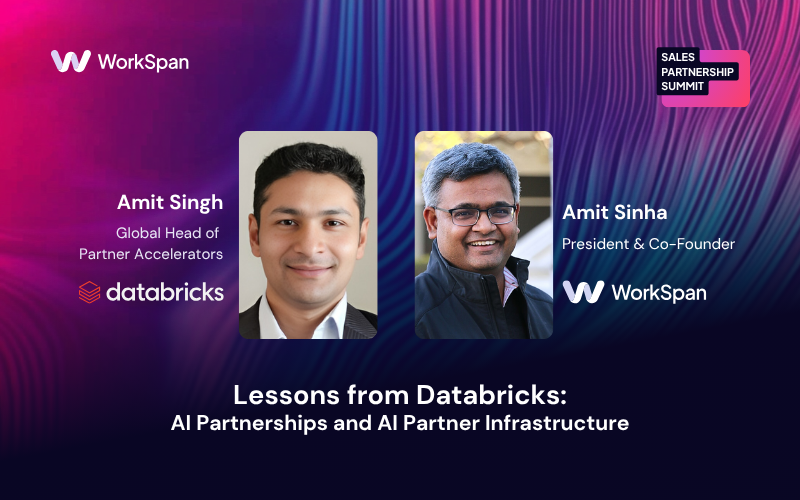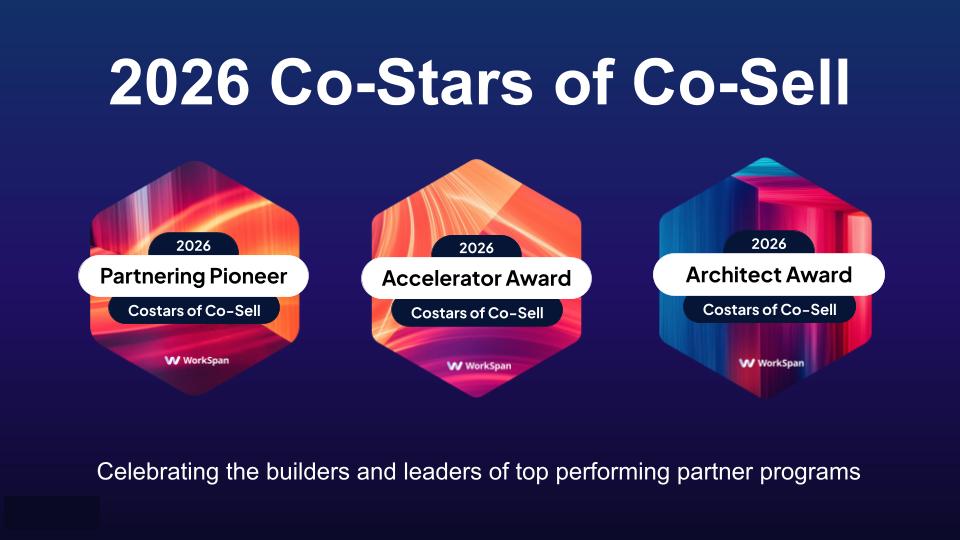
Databricks' recent overhaul of their Brickbuilder partner program signals a fundamental shift in how AI companies scale. During our recent WorkSpan summit, Amit Singh, Global Head of Partner Acceleration at Databricks, emphasized:
"Partnerships are going to be even more critical and important going forward with generative AI."
This transformation acknowledges the reality that enterprise AI implementation demands an ecosystem approach rather than individual vendors working alone.
The Infrastructure Shift: From Tool to Ecosystem
The traditional software playbook assumed you could build great technology and scale through direct sales. AI has flipped this model entirely.
"Customers now with AI agents and agentic AI are looking to completely transform their businesses," Singh explains. "That means reimagining their existing business processes and workflows." We're witnessing a shift from bolt-on solutions to comprehensive business transformation.
Such ambitious change requires elements no single vendor can provide independently: deep industry context, domain expertise, and trust built through years of implementation experience. This is where partnerships have evolved from "nice to have" to "essential infrastructure."
The Databricks Playbook: Building Partner Infrastructure at Scale
Rather than merely discussing the importance of AI partnerships, Databricks has systematically operationalized them.The revamped Brickbuilder program represents a blueprint for how AI companies should think about partner infrastructure:
1. Specializations: Partners can now specialize across specific industries or product lines like generative AI and data governance. This goes beyond basic certification to create deep, validated expertise in vertical AI applications customers can trust.
2. Brickbuilder Solutions: Industry-aligned IP that solves specific customer problems efficiently. These are vertical AI solutions built by partners who understand domain-specific challenges intimately.
3. Brickbuilder Accelerators: Product-aligned IP helps customers adopt Databricks more rapidly through tools like LLM ops, AI factories, and agentic systems that reduce time-to-value.
"There are strict requirements for a solution or partner to be specialized or certified with the Databricks Brickbuilder stamp," Singh notes. The program focuses on quality and proven customer outcomes rather than quantity.
What's brilliant about this approach is how it recognizes that AI adoption happens through partners, not around them.
Why GSIs Are Gaining Power, Not Losing It
Many early predictions in the AI sector claimed that AI would reduce the need for service partners. However, Databricks' strategy reveals the opposite trend occurring.
"People predicted that with GenAI, you won't need as many service partners. But we're discovering it's quite the contrary," observes my colleague Amit Sinha. The reason is counterintuitive but powerful: AI makes enterprise implementation more complex, not less.
"GSIs set the vision for a lot of enterprises," Singh explains. "They have deep industry expertise, visibility into companies' transformation goals, and know which solutions will resonate with customers." Their role extends beyond technology implementation to architecting comprehensive business transformation.
Major GSIs like Accenture and Deloitte have responded by building their own AI platforms on top of data intelligence platforms like Databricks. PWC launched an "agentic OS." These offerings represent productized AI capabilities combining the GSI's industry knowledge with technology providers' AI infrastructure.
An important evolution has occurred. "AI makes you more efficient at its core. That means customers now expect GSIs to deliver faster, with fewer resources—and different pricing models." The GSIs that win are the ones who use AI to transform their own delivery models while partnering with platforms that enable that transformation.
The Partner Infrastructure Gap AI Companies Face
This is exactly the challenge we've been solving at WorkSpan. In our conversations with AI companies and their partner ecosystems, we kept hearing the same infrastructure gap: partnerships teams could see the AI opportunity, but they lacked the systems to operationalize it at scale.
Traditional partnership tools were built for a simpler era, when partnerships meant quarterly business reviews and annual contracts. AI partnerships require real-time intelligence, dynamic deal collaboration, and the ability to activate partner relationships at the speed of AI-driven sales cycles.
What we've built with WorkSpan AI is partner infrastructure designed for the AI era:
AI Teammates for Every Partnership: Instead of waiting for a partner manager to be available, sales teams have AI agents trained on the unique context of each partnership—AWS, Google Cloud, key GSIs, ISV partners. Each agent understands the partner's solutions, joint value propositions, and how to navigate that specific relationship.
Partner Intelligence in Native Workflows: Sales reps get AI-powered partner insights directly in their CRM, embedded in their accounts and opportunities. No separate systems, no context switching—just intelligent partner recommendations when and where they need them.
Automated Partner Activation: From drafting co-sell emails to scheduling partner calls to submitting marketplace transactions, AI handles the operational complexity while humans focus on relationship building and deal strategy.
Data Intelligence Requires Partner Intelligence
Databricks has pioneered the concept of "data intelligence"—the idea that enterprises derive true AI value when they combine general intelligence models with their own proprietary data. "When you combine the general intelligence with your own data and solve domain specific problems, that's what we as an enterprise are focused on," Singh explains.
But here's what I've learned building WorkSpan: data intelligence requires partner intelligence to reach its full potential. Your proprietary data becomes exponentially more valuable when it's combined with your partners' complementary data, industry expertise, and customer relationships.
This is why companies like MongoDB have seen such dramatic results using WorkSpan AI to power their co-sell process with hyperscalers. Success requires both excellent data and strong partner relationships that can operationalize that data in customer-specific contexts.
The Trust Factor at Scale
Singh makes a crucial point about why partnerships matter even more in the AI era: "You want to bring in trusted partners to avoid horror stories. Partnerships bring the trust factor and help accelerate your go-to-market."
He's referencing cases like Air Canada's AI mishap, where poor AI implementation led to customer lawsuits and brand damage. In an era where AI mistakes can go viral and cause real business harm, customers want to work with ecosystems they trust over individual vendors.
This is why the infrastructure approach matters. When companies like Databricks invest in rigorous partner certification and when platforms like WorkSpan AI enable seamless partner collaboration, they're both improving go-to-market efficiency and building trust infrastructure that makes AI adoption safer for enterprises.
What This Means for AI Companies
Every AI company faces the same fundamental choice: build your go-to-market infrastructure for the pre-AI era, or build it for the ecosystem-driven reality of AI transformation.
From my perspective building partnership infrastructure for the world's largest tech ecosystems, I see three imperatives:
1. Platform Thinking Over Product Thinking: The winning AI companies aren't just building products—they're building ecosystems. Success requires architecture that enables partner-built solutions, not just partner-sold solutions.
2. Partner Intelligence as Core Infrastructure: Just as you wouldn't build an AI application without good data infrastructure, you can't build an AI go-to-market without good partner intelligence infrastructure.
3. Trust Through Ecosystems: In a world where AI mistakes can cause real damage, customers will choose trusted ecosystems over individual vendors. Your partner infrastructure becomes your trust infrastructure.
The Bottom Line
Every company wants to be a data and AI company, as Databricks CEO Ali Ghodsi noted. But becoming one isn't something you can do alone.
The companies that succeed will be those who recognize that AI partnerships are the new infrastructure layer that makes enterprise AI transformation possible. Whether you're an AI company building for scale, a GSI productizing your AI capabilities, or an enterprise looking to deploy AI safely, your success depends on ecosystem thinking, not solo execution.
Databricks has shown the blueprint. The question for every AI company is whether you're building partnership infrastructure for this new era, or hoping the old playbooks will somehow work in a fundamentally different market.
Mayank Bawa is CEO and Co-founder of WorkSpan, the partnership platform powering ecosystems at companies like MongoDB, Databricks, and hundreds of other enterprise technology leaders. WorkSpan AI helps AI companies operationalize partner infrastructure at scale.
Heading
Heading 1
Heading 2
Heading 3
Heading 4
Heading 5
Heading 6
Lorem ipsum dolor sit amet, consectetur adipiscing elit, sed do eiusmod tempor incididunt ut labore et dolore magna aliqua. Ut enim ad minim veniam, quis nostrud exercitation ullamco laboris nisi ut aliquip ex ea commodo consequat. Duis aute irure dolor in reprehenderit in voluptate velit esse cillum dolore eu fugiat nulla pariatur.
Block quote
Ordered list
- Item 1
- Item 2
- Item 3
Unordered list
- Item A
- Item B
- Item C
Bold text
Emphasis
Superscript
Subscript



.png)

